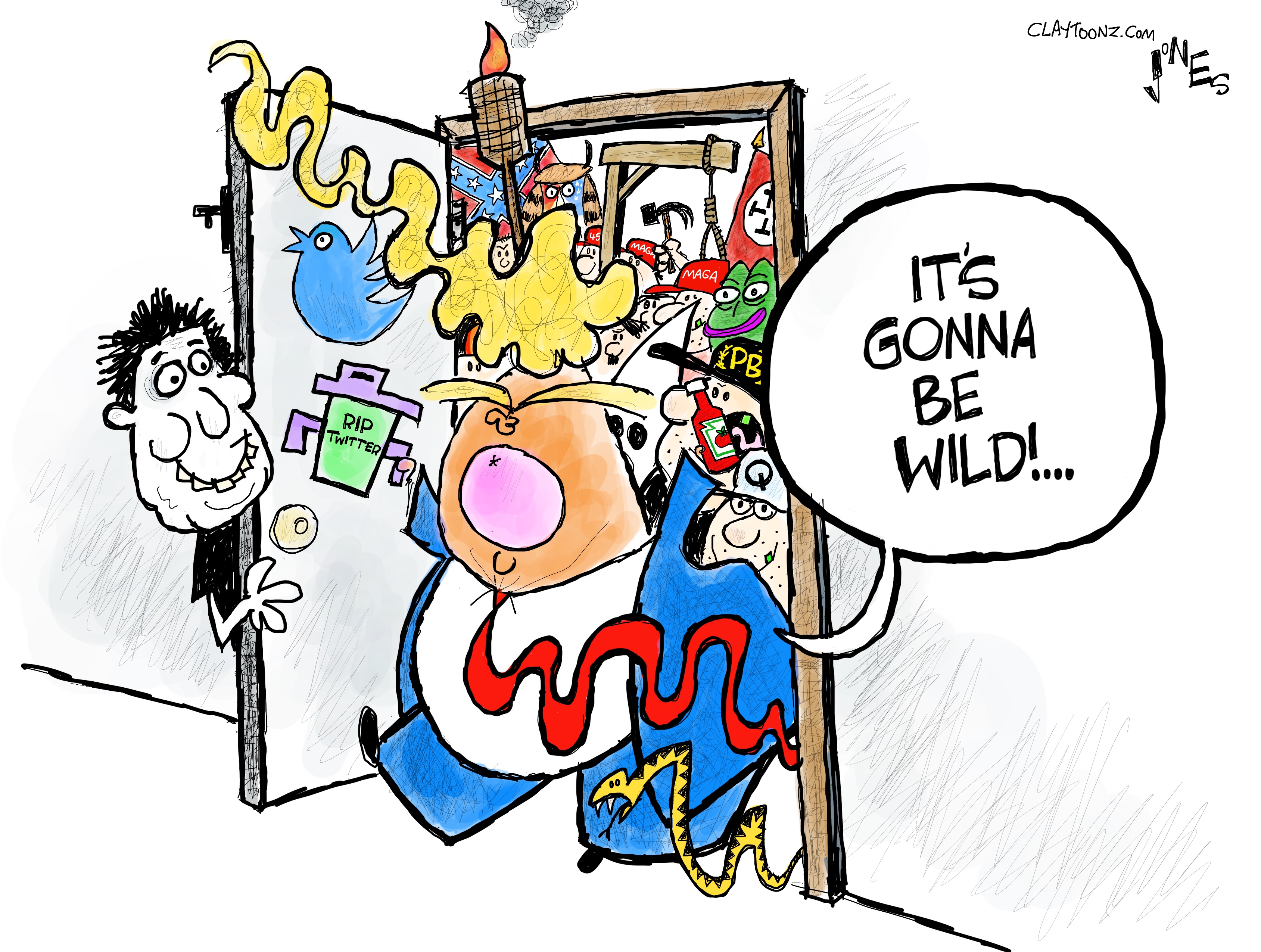
Maybe soon. Trump-related stories were all over the news this week,
but they point towards a future where Trump may not matter.
I didn’t want to write another Trump post this week, but the convergence of headlines was hard to ignore. This week:
- Trump announced his 2024 candidacy.
- Republicans and conservative media were surprisingly cool about a Trump candidacy.
- Merrick Garland named a special prosecutor to investigate/prosecute Trump.
- Elon Musk restored Trump’s Twitter account.
So I guess I have to pay attention.
Has he finally jumped the shark? Last week I was skeptical that the GOP was finally getting over Trump. Sure, he endorsed a string of bad candidates who lost winnable races, and a statistical analysis indicated that MAGA Republican candidates for Congress ran about five points behind non-MAGA Republican candidates. And yes, Ron DeSantis’ surprisingly large victory margin in Florida supported the idea that he is a winner while Trump is a loser. So it wasn’t all that surprising that a few GOP leaders and conservative pundits began inching away from the Former Guy.
A week ago, I wasn’t buying it. Republicans have tried to move away from Trump before — most recently after he incited a mob to attack Congress in an effort to hang onto power after losing the 2020 election. But it never lasts. After January 6, it took about three weeks for Kevin McCarthy to go from wanting Trump to resign to making a Mar-a-Lago pilgrimage. Why should this time be different?
But this week, maybe I am buying it. I’m at least examining the possibility. Trump announced his 2024 candidacy Tuesday, and the response was not what either he or I expected. No major network carried the whole speech live: Fox and CNN started to, but then cut away as Trump rambled. The Fox coverage was particularly Orwellian: As Trump droned on, the network’s talking heads enthused about the greatness of the event they had stopped broadcasting. “This was an absolutely brilliant speech,” Mike Huckabee proclaimed, using the past tense to describe something that was still happening, “the best I have heard him give in a long time.”

Most news outlets ran articles on the speech, but they were more skeptical than thrilled or horrified. The snarkiest was Rupert Murdoch’s New York Post, whose cover said “Florida Man Makes Announcement, page 26”. Trump had probably pictured his fans cheering and his enemies trembling in fear or outrage. But I don’t think he expected so many people to laugh.
The Democratic response is also telling. Democrats worry about whether Biden is up for another run, about who could replace him if he isn’t, and about whether younger Trumpists like DeSantis or Youngkin might be harder to demonize than the Mar-a-Loser. Beating Trump, on the other hand, is a familiar challenge. We did it before, we’ll do it again.
Et tu, pastor? Apparently even Evangelical leaders are jumping off Trump’s sinking yacht.
“He used us to win the White House. We had to close our mouths and eyes when he said things that horrified us,” [televangelist Mike] Evans wrote. “I cannot do that anymore.”
Had to? The supposed heirs to the tradition of the Prophet Nathan and John the Baptist had to bow down to Trump. And the spark causing Evans to turn away is not some new outrage that he just can’t stomach — or even a straw that finally broke his back — but Trump’s loss of power and influence.

What might be happening. Here’s my theory: The hard-core Trump cultist worries about being a loser, but in his mind he becomes a winner by identifying with the ultimate winner, Donald Trump. As the classic children’s hymn “Jesus Loves Me” puts it: “They are weak, but He is strong.” Trump is fighting the same dark forces that the cultist blames for his own disappointments, but Trump is going to defeat them.
Trump constantly stokes this identification, claiming that people who attack him are really attacking his followers, as if his followers had been assaulting women, taking money from foreign governments, or stealing classified documents.
But what if Trump starts to look like a loser himself? He rolled through the 2016 primaries, then in November unexpectedly won in the Electoral College in spite of losing the popular vote by millions. When he lost bigly to Biden in 2020, he said he really won, and his cult agreed to believe that story. But in 2022, Trump’s candidates lost all over the country. (And this is where the Trump cult’s anti-Biden and anti-Democrat propaganda boomerangs: How could all those MAGA Republicans possibly have lost? Biden is senile. Fetterman is a vegetable after his stroke. Everybody hates Gretchen Whitmer because of her Covid tyranny. How did they win? How did they beat Trump?)
So you lose once and claim the other guy cheated. OK, maybe. But you can’t go to that well over and over. The message has to be: “The other guy cheated me, and I’m going to make him pay.” If you can’t make him pay, if you get cheated again and again — then you’re just like the rest of the losers.
What happens then? I don’t expect Trump’s followers to turn on him because he has stopped winning. But I do think their enthusiasm starts to fade, because he’s not delivering the ego boost they need any more. So maybe they just quietly drift away.
Establishment Republicans hope someone like DeSantis can excite the base without reproducing Trump’s embarrassing transgressions, but I don’t that’s going to work. Trump’s trangressiveness is an irreplaceable part of his appeal. He does whatever he wants. He calls Mexicans rapists, cheats the taxman, taunts his opponents with playground nicknames, grabs women by the pussy — and gets away with it all. That’s what being a “winner” means to Trump’s base.
Telling it like it isn’t. The Atlantic’s David Graham made another good observation about the difference between Trump 2024 and Trump 2016. In spite of all his exaggerations and lies, Trump 2016’s appeal
was built on his willingness to speak the supposedly obvious facts that other politicians would not. He would tell voters that the political system was rigged toward donors. He would say that free-trade policies had harmed many Americans. If they were racist or xenophobic, he’d speak their truths, too. The central appeal was common sense, even when it was neither common nor sensical.
But Trump 2024 asks his followers to disbelieve things they can see and misremember events they lived through.
Consider this account of his presidency from the announcement speech: “Two years ago when I left office, the United States stood ready for its golden age. Our nation was at the pinnacle of power, prosperity, and prestige, towering above all rivals, vanquishing all enemies, and striding into the future confident and so strong … There was never a time like this … When the virus hit our shores, I took decisive action and saved lives and the U.S. economy.”
Some people might want to remember 2020 that way, but few will be able to manage it.

The special counsel. Friday, Attorney General Merrick Garland appointed Jack Smith as special counsel to investigate events related to January 6, and also to the classified documents and presidential records found at Mar-a-Lago. In his press conference, Garland said:
Based on recent developments, including Trump’s announcement that he is a candidate for president in the next election, and the current president’s intention to be a candidate in the next election, I have concluded it is in the public interest to appoint a special counsel.
This announcement has both optimistic and pessimistic interpretations for people who want to see Trump held accountable for his crimes. The pessimistic interpretation is that Merrick Garland is adding his name to the list of people who couldn’t manage to nail Trump. James Comey couldn’t do it. Bob Mueller. The first and second sets of impeachment managers. The January 6 Committee. And now Merrick Garland. He passes the baton to Jack Smith — and why should Smith do any better than the previous investigators?
Andrew Weissman, who was part of the Mueller investigation and wrote the book Where Law Ends about it, believes this time is different.
The new Special Counsel, unlike Special Counsel Mueller, WILL be able to indict Trump as he is no longer POTUS and WILL NOT have to worry about being fired from one day to the next by sitting POTUS. And he inherits a large amount of evidence and a team that is in place already. The new Special Counsel also will not have to overcome, as Special Counsel Mueller did, Trump’s dangling presidential pardons to thwart cooperation with the investigation. Or using DOJ to stymie and misrepresent the investigation.
New York magazine’s Intelligencer column presents a more balanced view: However it unfolds, this process is still going to take a long time. The big timing decision for Smith to make is whether to indict Trump quickly for the Mar-a-Lago documents — a fairly simple case that is nearly ready to go — or to wait until a more complex January 6 investigation is complete and charge everything at once.

Trump and Twitter. And speaking of sinking yachts, Elon Musk arbitrarily announced the reactivation of Trump’s Twitter account Saturday evening. Trump had been banned from Twitter because he misused it to foment violence on January 6, and seemed like to misuse it again. To me, that logic still holds, but apparently not to Musk. He had previously said that the no major reinstatements would happen until he could convene “a content moderation council with widely diverse viewpoints”. But never mind. Musk posted a poll Thursday and announced the result Saturday.
Anyway, at the moment all this means is that Trump’s old tweets are available again. Trump has not tweeted anything new yet, and his agreement with Truth Social (which he at least partially owns) puts restrictions on what he can post on other social-media platforms. So we’ll see what happens.
He may be worried about returning to Twitter only to see it quickly declare bankruptcy, which Musk has floated as a possibility. There’s a limit to how much failure his public image can stand to be associated with.

Comments
I really liked this bit:
“Establishment Republicans hope someone like DeSantis can excite the base without reproducing Trump’s embarrassing transgressions, but I don’t [think] that’s going to work. Trump’s trangressiveness is an irreplaceable part of his appeal. He does whatever he wants. He calls Mexicans rapists, cheats the taxman, taunts his opponents with playground nicknames, grabs women by the pussy — and gets away with it all. That’s what being a “winner” means to Trump’s base.”
Trackbacks
[…] This week’s featured post is “When can I stop writing about Trump?“. […]